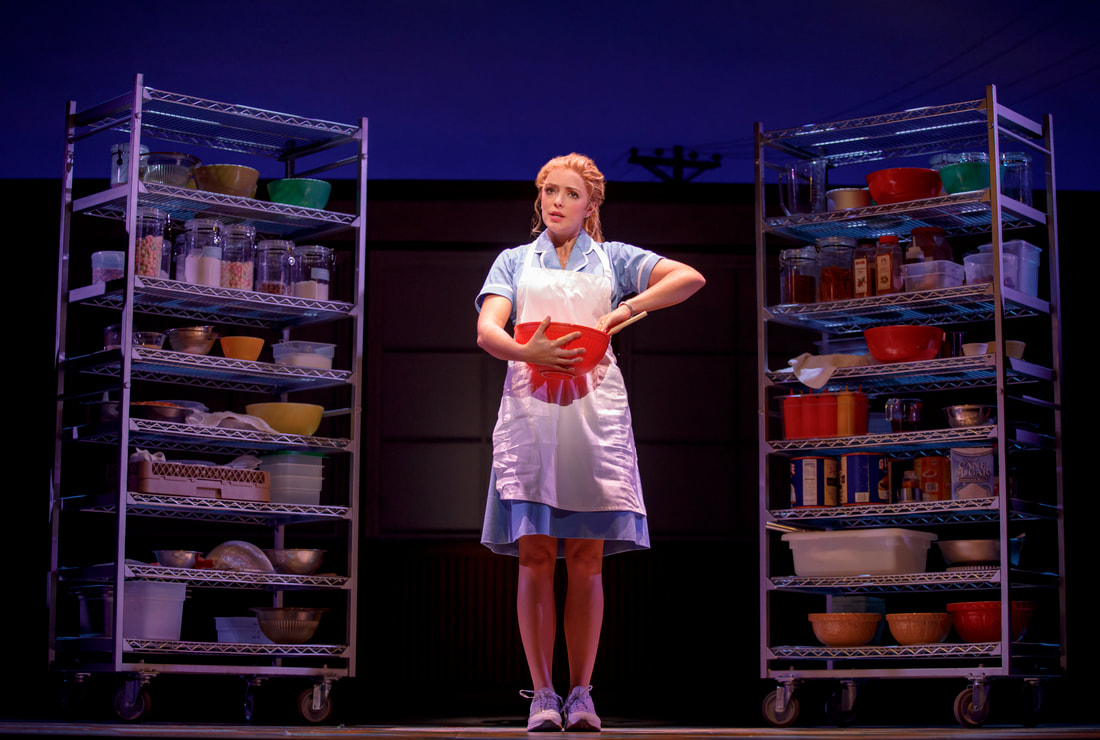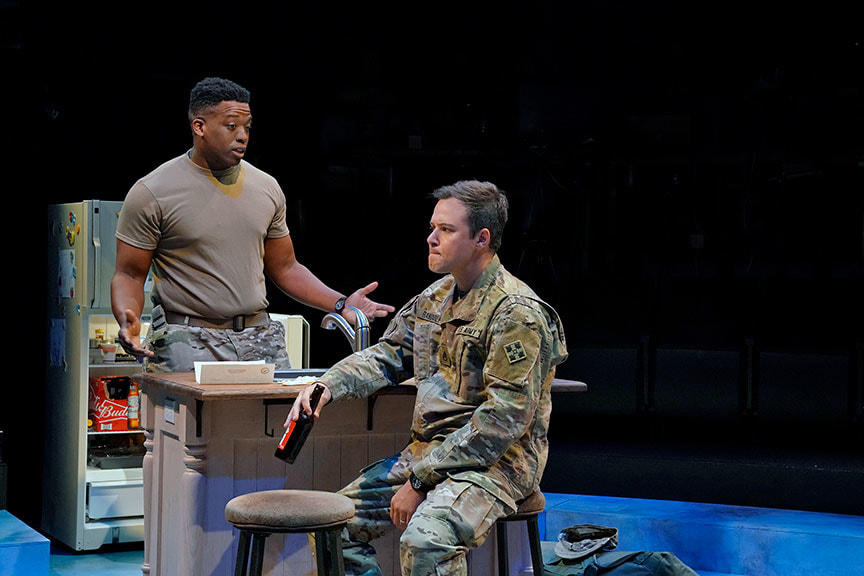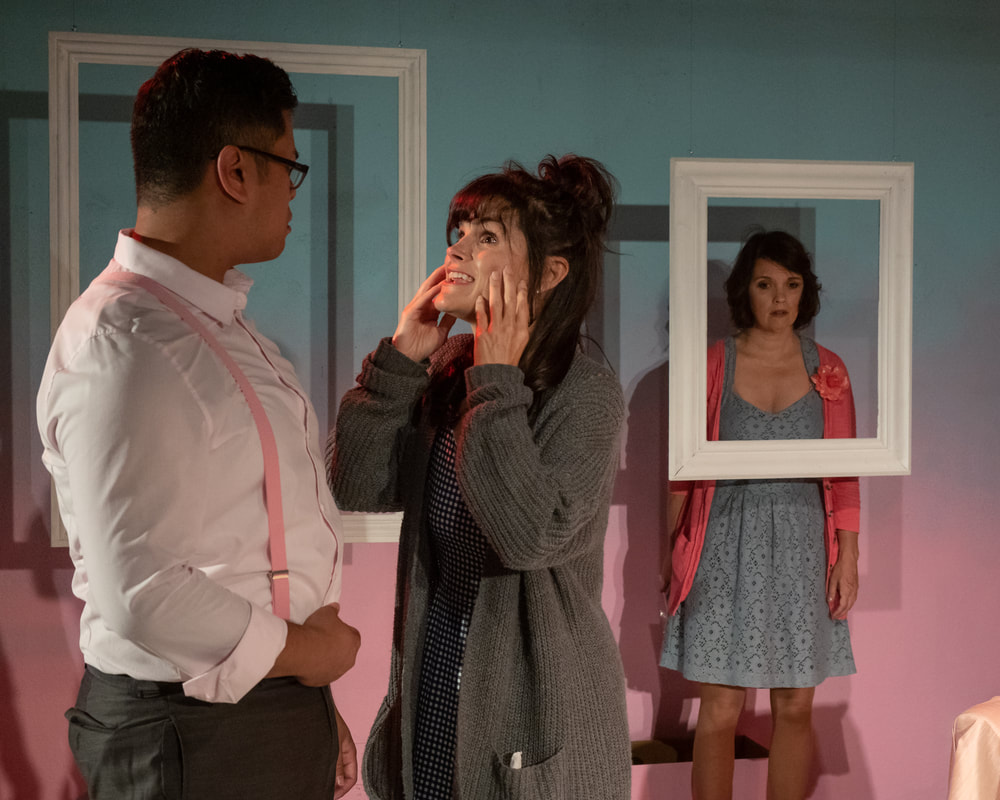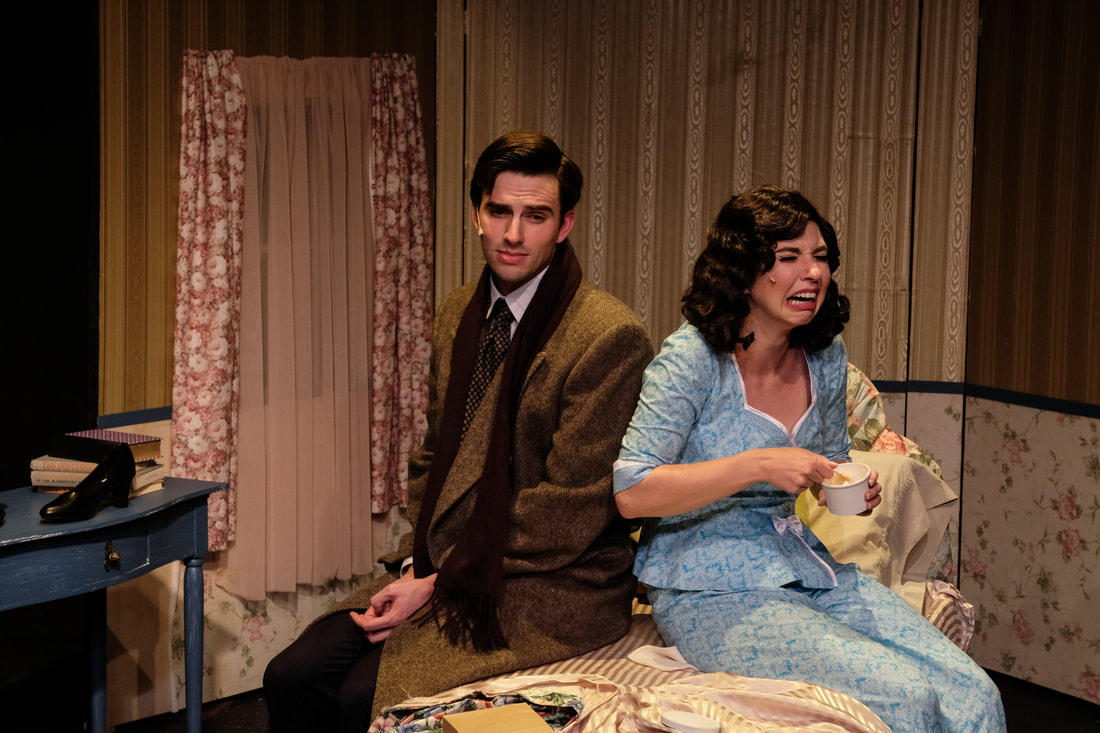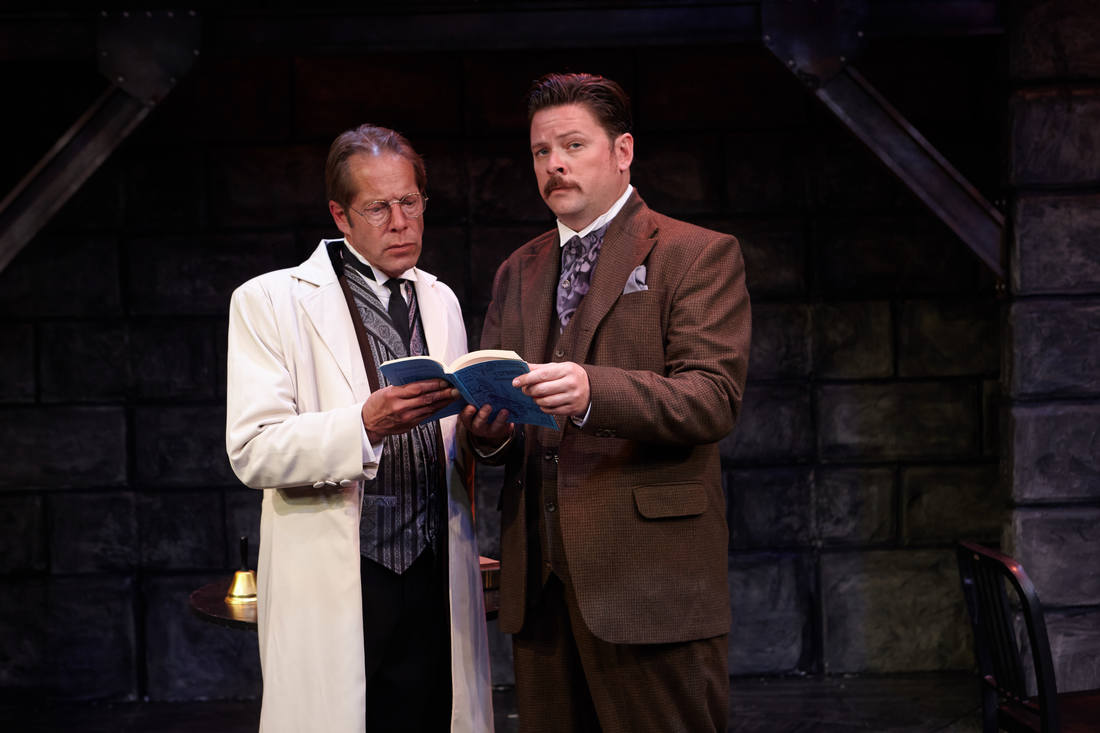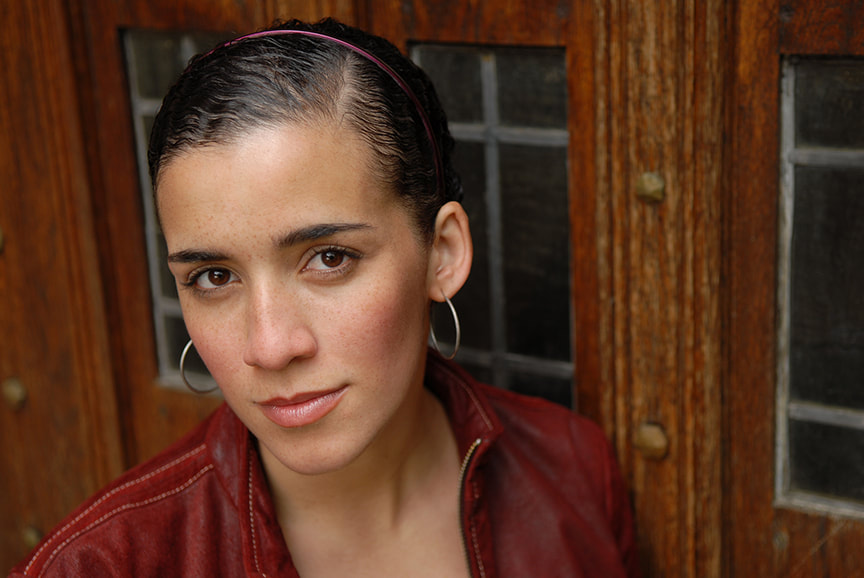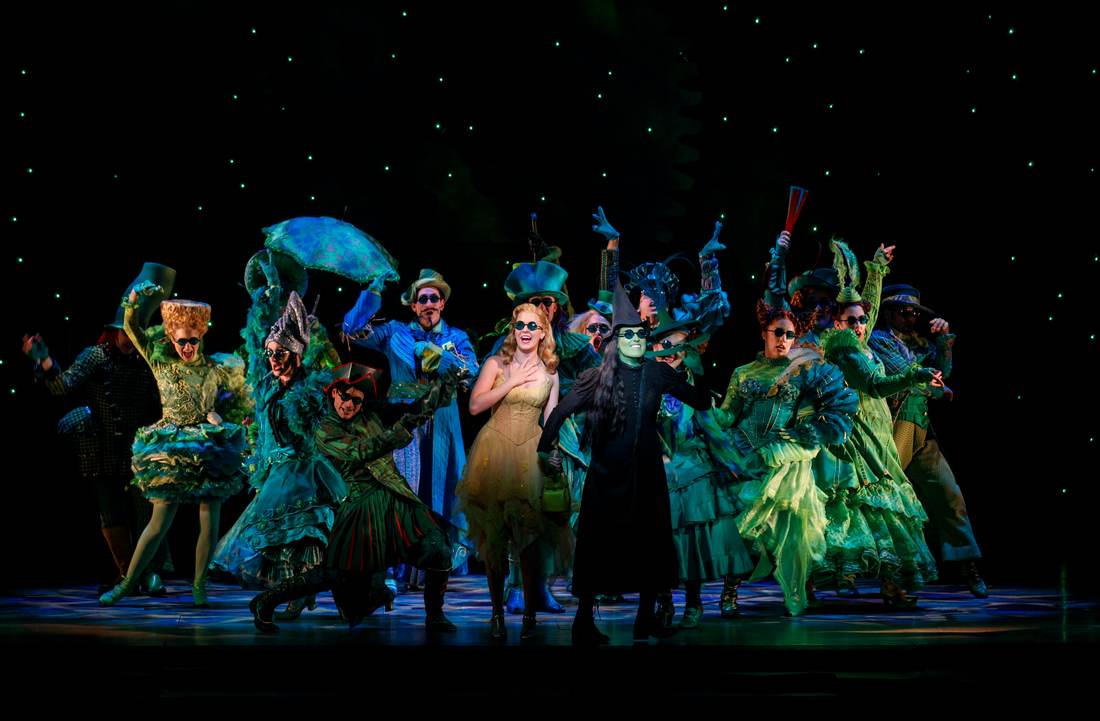|
"Waitress" serves up comedy and romance at the Civic Theatre. Photograph by Joan Marcus From the end of Act One through the first half-hour or so of Act Two, it appears as if everyone in the musical Waitress is in heat. Maybe it has something to do with all that pie.
Having her share of the fun is pregnant Jenna Hunterson (Christine Dwyer), a waitress at Joe’s Pie Diner in down-home USA who’s having a fling with her gynecologist (Steven Good). When the fling goes full throttle, the pies become nearly as naughty a prop as in the puerile “American Pie” flick. But Waitress, based on the 2007 indie film starring Keri Russell and written by Sara Bareilles (music and lyrics) and Jessie Nelson (book), is not the least puerile. Its take on love, which is really secondary to the search for identity and independence going on with its main character, is never smarmy. Broadway San Diego has brought Waitress to town for the first time, and not even the dubious acoustics of the Civic Theatre can diminish its charm. Between Bareilles’ breezy ensemble tunes and earnest ballads, the many inventive names for pies, and a cast of characters universally likable (except for Jenna’s intentionally abhorrent spouse), this musical is as savory as pastry right out of the oven. Waitress runs through Sunday Dec. 2 at the Civic Theatre, downtown. Tickets $26.50 to $126.50. www.broadwaysd.com
0 Comments
Dallas DeLeon (left) and Aaron C. Finley in "Clint Black's Looking for Christmas." Photo by Ken Howard But for its country music-inflected tunes and a plot constructed around a returning soldier’s psychological trauma, Clint Black’s Looking for Christmas would fit nicely among the Hallmark Channel’s sugary and sentimental holiday movies. This world premiere on the Old Globe’s intimate White stage is a predictable yuletide diversion embracing familiar tropes of the season: the shopping crush, the precocious child’s Christmas pageant, etc. The plight of surviving Army veteran Mike Randolf (Aaron C. Finley), who’s literally haunted by the ghost of his best friend (DeLeon Dallas) killed in Afghanistan, is thoughtfully explored in terms of its impact on Mike’s wife and child (Liana Hunt and Kaylin Hedges). Black’s songs, all but four of them taken from his 1995 album “Looking for Christmas,” comfort and distract, guaranteeing that Mike’s woes won’t undermine a happy ending or a happy Christmas.
Clint Black’s Looking for Christmas is prone to cloying cuteness when it’s not occupied with the soldier’s anguish, but throughout it certainly has its heart in the right place. (Review originally published in San Diego CityBeat on 11/28/18.) As soothing as a hot cup of Earl Grey, Miss Bennet: Christmas at Pemberley imagines a post-“Pride and Prejudice” scenario in which heroine Elizabeth Bennet, now married to her beloved Mr. Darcy, is hosting family and friends for Christmas at her family estate in Pemberley. Chief among the guests is young sister Mary (Nadia Guevara), who is beautiful but bookish and seemingly uninterested in romance. That doesn’t last for long in this charming if sedate play written by Lauren Gunderson and Margot Melcon. Mary soon encounters a candidate for romance (Carter Piggee) who is as awkward as she but just as infatuated.
New Village Arts’ production directed by Kristianne Kurner (who also designed a magnificent set) relies on the script’s refined, drawing-room conversation, its quaint British-isms and featherweight romantic conflicts over which Jane Austen devotees swoon. It’s all very pretty and proper, with whatever edge it possesses provided by the talented Guevara. (Review originally published in San Diego CityBeat on 11/18/18.) The setting for the forthright musical This Beautiful City is Colorado Springs in 2006, around the time of that year’s midterm elections. There, a Rocky Mountain high prevails: Evangelicals galore are getting high on Jesus. That’s bad news for non-believers. It’s even worse news for anyone following an alternative lifestyle. The faithful, with their frozen, imbued smiles, are fighting a ballot measure that would acknowledge same-sex domestic partnerships. The locus for all the fire and brimstone is the New Life Church, founded by Ted Haggard.
Into this pit of intolerance ventured the Civilians, an investigative theater company from New York City. Its interviews with principals on both sides of the holy war resulted in This Beautiful City, written by the group’s Steven Cosson and Jim Lewis, with music and lyrics by Michael Friedman (who passed away last year from complications related to HIV/AIDS). Though it debuted 10 years ago, This Beautiful City is only now receiving its San Diego premiere: at Diversionary Theatre under the direction of Matt Morrow. The production there is spirited and wonderfully performed. It boasts an ardent, versatile ensemble of actors, all portraying multiple persons in the Colorado Springs maelstrom. The standouts are Michael Cusimano and Tony Houck, who besides their characterizations play guitar and keyboards respectively. The tone of the show wavers between parodying the nearly too cultish to parody evangelicals and striking serious chords about the hate masquerading as love that beset the picturesque Colorado community. When the scandal surrounding Haggard (which led to his downfall) arrives, This Beautiful City goes from simmer to boil. Much of the time, the humor is more persuasive than the show’s quieter moments, some of them as sanctimonious as the sanctimony being assailed. Throughout, however, the musical numbers of Friedman reverberate with emotion in the small but acoustically sound Diversionary space. Its presence on the local theater scene now, when holiday fluff will soon take over almost completely, guarantees that thoughtful alternatives are available. This Beautiful City asks its audiences to ponder the true meaning of love and good will. (Review originally published in San Diego CityBeat on 11/21/18.) Hannah Logan (center) stars in "Melancholy Play." Photo by Jim Carmody There are those, either out of a desire to nurture or out of just plain desire, who find extremely sad people a turn-on. That’s what bank teller Tilly (Hannah Logan) has going for her in Sarah Ruhl’s invitingly peculiar Melancholy Play, being staged by InnerMission Productions. Tilly’s sheer morosity charms, in order: her neurotic shrink Lorenzo (Scott Striegel), a tailor named Frank (Patrick Mayuyu), her hairdresser Frances (Cristyn Chandler), and Frances’ lover, a nurse named Joan (Vanessa Dinning). Ruhl’s characters, all on stage at the same time either interacting or silently standing behind window frames, speak in benumbed profundities to the subject of sadness – as a condition and as an attraction. Then Melancholy Play turns sharply askew, becoming, as the play is described in the addendum to its title, a contemporary farce. When Tilly turns happy (a birthday scene, complete with sing-along, is the show’s manic moment), those around her turn melancholy, Frances to such a degree that she also turns into an almond. An almond, the program notes explain, is the shape of the “gray matter inside each cerebral hemisphere involved with the experiencing of emotions.”
In spite of the determined weight and absurdity of Melancholy Play, the production directed by InnerMission’s Carla Nell is a balm for the anxiety of life at its most hectic, and the nearly slow-motion action of the players is hypnotic. Chiefly Logan’s Tilly. Logan wrings every ounce of emotion from her haunted character, whether succumbing to sobs or earnestly addressing an almond in her hands. The triumph is, she never comes off as nuts. (Review originally published in San Diego CityBeat on 11/14/18.) Luke Monday and Taylor Magee in "She Loves Me." Photo by Ken Jacques The burning question in the romantic musical “She Loves Me” isn’t whether unknowing lonely hearts club correspondents Georg Nowack and Amalia Balash will get together. It’s what misunderstandings and harmless complications will ensue before they do. That’s the charm of this underappreciated show written by Jerry Bock and Sheldon Harnick (with a book by Joe Masteroff). Bock and Harnick are better known for composing “Fiddler on the Roof,” which opened on Broadway in 1964, a year after “She Loves Me” debuted. “She Loves Me” is no “Fiddler on the Roof,” but as a Scripps Ranch Theatre production directed by Ted Leib demonstrates, it’s festive fun ideal for the arrival of the holidays.
If the premise of “She Loves Me” strikes a familiar chord, it should. The root of the story is a 1937 play by Hungarian Miklos Laszlo. It inspired the 1940 film “The Shop Around the Corner,” with Jimmy Stewart and Margaret Sullivan as the initially dueling co-workers who don’t realize that each is the other’s romantic correspondent. Nearly a decade afterward came “In the Good Old Summertime,” with Judy Garland and Van Johnson. “She Loves Me,” which returned the story to the stage but as a musical, followed in 1963. (Thirty-five years later, the film “You’ve Got Mail” starring Tom Hanks and Meg Ryan found the correspondents communicating via this relatively new medium called the internet.) The enduring connection between these various incarnations and the palpable appeal of “She Loves Me” is the would-be lovers’ all too human insecurities. By whatever names, they hunger for true love even as they fear they won’t measure up. “She Loves Me” is not blessed with a signature song. Neither is the setting, a perfume shop in Budapest in the mid-‘30s, particularly compelling. Its snappy characters and unflagging spirit of fun carry the day. SRT’s ambitious staging (a cast of 14, multiple set changes, two musical accompanists) is the company’s most wholly satisfying since its excellent “Vanya and Sonia and Masha and Spike” two years ago. Taylor Magee, possessing a sparkling soprano, delights as Amalia and gets laughs too in her Act 2 “Vanilla Ice Cream” number. Luke Monday is likable and natural as Georg, at home with both song and antics. The ensemble-driven “She Loves Me” guarantees everyone, right down to the delivery boy (Josh Bradford), a tune of his or her own. Basking in the opportunity are supporting players Tara Sampson, Danny Campbell, Joseph Grienenberger and Tanner Vidos. There’s also a cleverly choreographed (by Marc Caro-Willcox) café scene (“A Romantic Atmosphere”) in which Georg finds out that Amalia is his “Dear Friend” correspondent. She, of course, won’t learn the truth until the inevitable happy ending. Considering the tight confines of the Lenbough Legler Theatre stage, a “She Loves You” this seamless is no small achievement for the SRT cast, crew and musicians. Sure, this is a love story that’s been told multiple times before, but the payoff of two lonely people finding each other never gets old. (Review originally published in the San Diego Union-Tribune on 11/13/18.) Richard Baird (right) stars in "Holmes & Watson." Photo by Aaron Rumley An 1894 version of “To Tell the Truth,” North Coast Repertory Theatre’s Holmes & Watson summons Dr. John Watson, Sir Arthur Conan Doyle’s famous chronicler of the adventures of the great detective Sherlock Holmes, to an island asylum off Scotland where he is asked to identify which of three imprisoned men is the real Holmes. But in this production of Jeffrey Hatcher’s one-act puzzler, there’s no predicting where the story will go from there. In a mystery, and Holmes & Watson is decidedly a mystery, that’s a definite asset. Trying to keep up with false leads and red herrings is another thing. So is the play’s tendency to explain and explain some more in such a talky manner that the action, such as it is, can drag.
Director David Ellenstein employs enough active devices, such as gunshots, physical confrontations and flashbacks to the fated Reichenbach Falls in Switzerland where Holmes allegedly escaped death at hands of diabolical foe Professor Moriarty, to move the 85 minutes along. Holmes & Watson also benefits from the cool, magnetic presence of Richard Baird as Watson, who really is the play’s principal character. Baird projects the kind of Dr. Watson – composed, reasoned and fearless – that Doyle intended but which was often in film or TV adaptations portrayed as a sputtering satellite orbiting Holmes’ genius. Without giving away the goods, however, be forewarned that nothing or no one in Holmes & Watson is necessarily what they seem to be, and that’s the plum for mystery fans. Those neither particularly versed in the Holmes world nor enamored of twisting, turning plots may find this play wearisome. Though with the explicit title Holmes & Watson, it’s hard to imagine anyone wandering into the show unawares. Sherlock Holmes devotees should absolutely enjoy this smartly written take on a Doyle adventure, and the production’s costumes (designed by Kim Deshazo) and dingy asylum set (by Marty Burnett) are right in line with the period in all its trappings. It’s still early to qualify as holiday-season fare (and Holmes & Watson closes on Nov. 18), but this North Coast Rep offering is one to take the whole family or those out-of-town relatives to. Especially if they love a good mystery. (Review originally published in San Diego CityBeat on 11/7/18.) Patricia McGregor is directing "A Midsummer NIght's Dream." Photo courtesy of Old Globe Theatre The Old Globe Theatre’s fifth “Globe for All” touring program couldn’t have picked a choicer cut of Shakespeare than the fairy-inflected, featherweight A Midsummer Night’s Dream. You need not be a scholar of The Bard nor an experienced theatergoer to savor this whimsical romp. There’s enough stage play and silliness to maintain the attention span even of youngsters.
So it was at the Sunday afternoon staging on the top floor of the Central Library (the Shiley Special Events Suite) downtown. The room was packed with folks who happily all found something better – and more enlightening – to do than while away the first day of Standard Time in front of a computer screen or an NFL game. They were rewarded with a delightful performance of Midsummer, directed by Patricia McGregor (she previously directed the “Globe for All” Measure for Measure two years ago) and starring a game cast of nine, all of whom did at least double duty when it came to roles. For an experienced spectator like myself, the joy in the room was not merely the Midsummer production (though it is a witty, fast-moving and animated one), but seeing the faces of others in the crowd who might have been enjoying their first Shakespeare moment. That’s the gift that the Old Globe is giving to the San Diego community, in particular people who can’t afford or can’t get to the Balboa Park theater itself for shows. These “Globe for All” performances, being staged at 17 community partner venues like the downtown library, are free, but they’re also educational without being scholastic, accessible without being overly simplified, and presented by talented Globe artists with enthusiasm and love, both for the material and for the audiences. And love, as you know, is what A Midsummer Night’s Dream is all about. (A Midsummer Night’s Dream will also be presented on the Globe’s outdoor Lowell Davies Festival Theatre stage on Nov. 18 at noon and at 3:15 p.m. There will be a charge -- $10-$15 – for these public performances only.) Visit the Old Globe’s website, www.theoldglobe.org, to see the list of remaining “Globe for All” locations and performance times. "Wicked" runs at the Civic Theatre in downtown San Diego through Nov. 25. Photo by Joan Marcus Wicked, one of the most popular musicals of recent memory, is back in San Diego, at the Civic Theatre, downtown. Though I’d seen it twice before, last night proved more enlightening and more satisfying than ever. Why?
For starters, I took my 14-year-old niece to the show. She’d never seen Wicked, and she was as excited as if Christmas had already come. Anytime a Broadway show captures the fancy and imagination of young audiences is in itself exciting and bodes well for the future livelihood of American theater as an art form. Second, it occurred to me as I enjoyed this musical adaptation (by Winnie Holzman and Stephen Schwartz) of Gregory Maguire’s 1995 novel “Wicked: The Life and Times of the Wicked Witch of the West” that Wicked is a story not only about the rushes to judgment we make as regards good and bad, but more important a celebration of female empowerment and of the sacred bond of sisterhood. These are critical comprehensions not only for the fractured time in which we reside in America, but for men and women, boys and girls alike. As to the national touring company that’s in town through Nov. 25, it’s blessed with two outstanding actresses in the leads: Jackie Burns is a fierce, unflinching Elphaba whose passionate vocals elicited cheers after her signature numbers “I’m Not That Girl,” “No Good Deed” and, naturally, “Defying Gravity,” the best-known song in Wicked’s score. As the yang to Elphaba’s yin, Kara Lindsay’s Glinda beautifully balances her comic timing and physicality with a crystalline voice. The remainder of the sweeping cast is vibrant and exquisitely costumed, though none of the other characters in Wicked is as remotely important or compelling as its frontwomen. In fact, the shticky number given to the Wonderful Wizard of Oz (Jason Graee), “Wonderful,” still strikes an out-of-place note. Tickets to Wicked may be difficult to come by (there is a lottery system offered during the run), but they’re worth defying gravity, or whatever obstacle, for. |
AuthorDavid L. Coddon is a Southern California theater critic. Archives
July 2024
Categories |
David Coddon |
|
